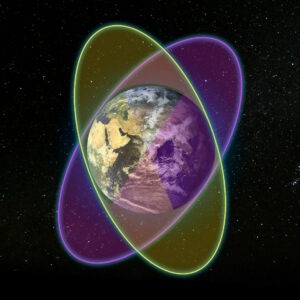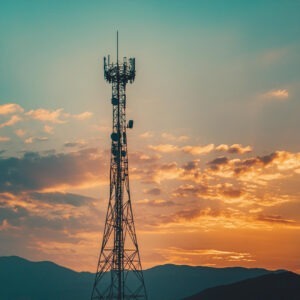Um eine globale Abdeckung zu erreichen, bestehen GNSS-Systeme aus einem...
WeiterlesenIn today’s connected world, Global Positioning System (GPS) technology plays a fundamental role in various aspects of our lives, from navigation and transportation to emergency services and outdoor recreation. However, the reliability and accuracy of GPS signals depend on a variety of factors. These are often overlooked because they are too obvious and some factors may not be known to everyone.
In this article, we’ll look at some key factors that affect the availability and accuracy of GPS signals.
This once again highlights how complex this ubiquitous technology that we use every day is.
The basics of GPS signal reception
GPS is based on a network of satellites that orbit the earth and continuously send out signals. These are received by GPS receivers on the ground. To calculate an accurate position, a GPS receiver requires signals from at least four satellites. Each satellite sends signals with precise timing information and its own orbital parameters.
We explain a detailed description of how the GPS position is determined in our article
How GPS Works: How Your Device Knows Where You Are
Factors affecting the availability and accuracy of the GPS signal
The received signal strength and the transmission time required for signal transmission are essential parameters for determining an exact position. In the following list we will look at ten factors that influence the quality of the determined GPS position. However, the list is not complete and only highlights some of the influencing factors.
1.
Number of satellites
The more satellites a GPS receiver can detect, the more accurate its position calculation becomes. At least four satellites are required for 3D positioning.
2.
Satellite geometry
The placement of satellites in the sky affects the accuracy of GPS positioning. Optimal geometry with satellites spread across the sky leads to more accurate results.
3.
Atmospheric conditions
Atmospheric phenomena such as ionospheric and tropospheric effects can delay and distort GPS signals, affecting accuracy.
Ionospheric effects
The ionosphere is a layer of charged particles in Earth’s upper atmosphere. GPS signals passing through the ionosphere can experience delays due to the free electrons present there. These delays vary depending on factors such as time of day, season and solar activity. Ionospheric delays can cause errors in GPS signal timing and affect the accuracy of position calculations.
Tropospheric effects
The troposphere is the lowest layer of the Earth’s atmosphere and extends from the Earth’s surface to an altitude of about 10-15 kilometers (6-9 miles). Tropospheric effects on GPS signals mainly include signal refraction and delays due to variations in temperature, pressure and humidity. These effects can cause GPS signals to bend as they pass through the atmosphere, leading to inaccuracies in signal transit time and, as a result, errors in position calculation.
4.
Obstacles
Buildings, trees, and terrain can obstruct GPS signals or cause signal reflections, resulting in multipath errors and reduced accuracy.
5.
Urban canyons
In urban environments with tall buildings, signal reflections and multipath errors are more pronounced and affect the accuracy of GPS positioning. With signal reflections, for example, the signals are reflected from buildings, the ground or other objects before they reach the GPS receiver. On the one hand, this results in a longer path for the signal and, on the other hand, there is the possibility that the same signal is received multiple times.
6.
Satellite visibility
The visibility of satellites relative to the receiver affects signal strength and quality. Obstructions can reduce signal strength and affect accuracy.
7.
Receiver quality
The quality of the GPS receiver affects its ability to process weak signals and reduce multipath errors, thus affecting accuracy.
8.
Signal interference
Interference from other electronic devices or radio signals can interfere with GPS signals and cause inaccuracies in position calculations.
9.
Satellite orbits
Changes in satellite orbits or clock errors can cause GPS positioning errors.
10.
Signal deterioration
Intentional degradation of GPS signals (selective availability) or natural causes can affect signal quality and accuracy.
Error correction for improved accuracy
To reduce the impact of these factors on GPS accuracy, advanced algorithms and calculation models are used in GPS receivers. These algorithms compensate for signal delays, multipath errors and atmospheric effects. This improves the reliability and precision of GPS positioning.
Conclusion
While GPS technology has revolutionized navigation and location-based services, its accuracy depends on various environmental and technical factors. By understanding these factors, users can make informed decisions about when and where to rely on GPS technology.
Additionally, continued advances in GPS receiver technology and signal processing techniques improve the accuracy and reliability of GPS positioning. This ensures that it remains essential in our modern world.
Title image: vector / freepik
More blog articles
A-GPS – Eine Technologie zur Verbesserung der GPS-Leistung
Assisted GPS (AGPS), eine Technologie, die eine schnellere Ortung, verbesserte...
WeiterlesenMehr als GNSS/GPS: Alternative Systeme zur Positionsbestimmung auf der Erde
Wenn wir an Standortbestimmung denken, kommen uns häufig globale Navigationssatellitensysteme...
Weiterlesen



